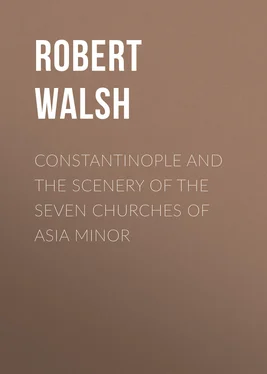Robert Walsh - Constantinople and the Scenery of the Seven Churches of Asia Minor
Здесь есть возможность читать онлайн «Robert Walsh - Constantinople and the Scenery of the Seven Churches of Asia Minor» — ознакомительный отрывок электронной книги совершенно бесплатно, а после прочтения отрывка купить полную версию. В некоторых случаях можно слушать аудио, скачать через торрент в формате fb2 и присутствует краткое содержание. Жанр: foreign_prose, foreign_home, История, foreign_antique, на английском языке. Описание произведения, (предисловие) а так же отзывы посетителей доступны на портале библиотеки ЛибКат.
- Название:Constantinople and the Scenery of the Seven Churches of Asia Minor
- Автор:
- Жанр:
- Год:неизвестен
- ISBN:нет данных
- Рейтинг книги:5 / 5. Голосов: 1
-
Избранное:Добавить в избранное
- Отзывы:
-
Ваша оценка:
- 100
- 1
- 2
- 3
- 4
- 5
Constantinople and the Scenery of the Seven Churches of Asia Minor: краткое содержание, описание и аннотация
Предлагаем к чтению аннотацию, описание, краткое содержание или предисловие (зависит от того, что написал сам автор книги «Constantinople and the Scenery of the Seven Churches of Asia Minor»). Если вы не нашли необходимую информацию о книге — напишите в комментариях, мы постараемся отыскать её.
Constantinople and the Scenery of the Seven Churches of Asia Minor — читать онлайн ознакомительный отрывок
Ниже представлен текст книги, разбитый по страницам. Система сохранения места последней прочитанной страницы, позволяет с удобством читать онлайн бесплатно книгу «Constantinople and the Scenery of the Seven Churches of Asia Minor», без необходимости каждый раз заново искать на чём Вы остановились. Поставьте закладку, и сможете в любой момент перейти на страницу, на которой закончили чтение.
Интервал:
Закладка:
The scenes of carnage that followed are revolting to humanity. The Roman pontiff himself, who had granted a plenary indulgence to all who engaged in the expedition, was compelled to denounce their brutality. He accused them of “sparing neither age nor sex, nor religious profession, of the allies they came to assist; deeds of darkness were perpetrated in the open day; noble matrons and holy nuns suffered insult in the Catholic camp.” As an instance of individual suffering, an imperial senator, Nicetas, an eye-witness, details what he himself endured. His palace being reduced to ashes, he fled for refuge to an obscure house in the suburbs of the town. Here he concealed himself, guarded by a friendly Venetian in disguise, till an opportunity occurred of saving his own life, and the chastity of his daughter, from the ferocious crusaders who were pillaging the city. On a winter’s night, with his wife and tender child, carrying all they possessed on their shoulders, they fled for life; and, in order to disguise their rank and features, smeared their clothes and faces with mud; nor could they rest a moment, from their pursuers, till they reached a distance of forty miles from the capital. On their road, they overtook the venerable Greek patriarch, the head of the Christian church in the East, flying also for his life, mounted on an ass, and almost naked. Nicetas afterwards lived to instruct and inform the world, by his important history of these events.
Meantime the captors glutted, without restraint, every passion. They burst into the church of Santa Sophia, and other sacred edifices, which they defiled in the most wanton manner. They converted sacred chalices into drinking-cups, and trampled under foot the most venerable objects of Christian worship. In the cathedral, the veil of the sanctuary was torn to pieces for the sake of the fringe, and the finest monuments of pious art broken up for their material. It would be too revolting to detail all the particulars of these impious outrages; let one suffice. They placed on the throne of the patriarch a harlot, who sang and danced in the church, to ridicule the hymns and processions of the Oriental Christian worship.
In those excesses it was that this noble city suffered its first dilapidation. The monuments of ancient art, collected from all parts of the world, were defaced and broken to pieces, not simply from a bigoted rage against any superstition different from their own, but from a crusade of ignorance against whatever bore the stamp of literature and science. A contemporary writer details particular specimens of art that were wantonly broken and destroyed; and the present denuded state of the city attests that the deeds of those barbarians were as destructive as those of the equally ignorant Turks. Their utter contempt for learning was displayed in various ways: in riding through the streets, they clothed themselves and their horses in painted robes and flowing head-dresses of linen, and displayed on them pens, ink, and paper, in ridicule of the people who used such worthless things. It was therefore no exaggeration when the Greeks called them Αγραμματοι και αναλφαβετοι Βαρβαροι, “Barbarians who could neither read nor write, who did not even know their alphabet.”
The Latins, who had thus seized on the capital, usurped the whole of the Grecian territories, and divided it among themselves. Five sovereigns, of the western invaders, occupied the throne in succession, till it descended to Baldwin. Michael Palæologus was destined to restore the ancient and rightful dynasty. In the year 1261, Alexius, a noble Greek, who was dignified with the name of Cæsar, commanded a body of troops in his service. He crossed the Hellespont into Europe, and advanced cautiously under the walls of the city. There was a body of hardy peasantry, at that time cultivating the lands of Thrace, of very doubtful allegiance. They were called volunteers, for they gave their services freely to any one who paid them. These bold men were induced to join themselves to the forces of Alexius; and, by stratagem, they entered the town. They gained the co-operation of a Greek, whose house communicated with the wall by a subterranean passage. Through this, Alexius was introduced with some of his volunteers; but he had scarcely passed the golden gate, when the peril of the enterprise struck him, and his heart failed him. He was pushed on, however, by his bolder companions, and at length emerged from the dark passage into the Greek house in the heart of the city. From hence they suddenly issued, and, though few in number, soon filled the streets with terror and dismay, from the suddenness of their attack, and the unknown extent of the danger. But every one was predisposed to join the enterprise. They looked upon the Latin conquest with irrepressible and increasing horror, and the streets were soon filled with shouts for Michael. Baldwin, utterly unapprehensive and unprepared, was suddenly roused from his sleep: he made no attempt to preserve his usurped power. He escaped to Italy, where he lived a private life for thirteen years, an object more of contempt than pity, vainly soliciting aid to recover a kingdom which he had neither right to keep, nor courage to defend.
The Greeks were thus restored to their capital, after their Latin allies had held an unrighteous possession of it for fifty-seven years. As the ravages of their hands were irreparable and permanent records of their oppression, so the memory of them was indelible. It caused that irreconcilable animosity between the eastern and western people of the same faith, which has widened, to an unapproachable distance, the separation of the two churches, so that it is likely nothing within the probability of human events will ever diminish it. To such an extent had it reached, and so deeply did it rankle in the minds of the Greeks, that, two centuries after, when they were about to be overwhelmed by the resistless power of the Turks, they had rather trust to the tender mercies of the followers of Mohammed, than seek a perilous aid from their fellow-christians. To this day the memory of these events is recent in the minds of the people of Constantinople, and it has generated a lasting hostility to the Latin church, which seems only to increase and strengthen with revolving years.
Immediately after the restitution of the city to the Greeks, a new feature was added to it: another western people were received into it, not as allies with arms in their hands, but as something still more useful−merchants, to cultivate the arts of peace, and enrich the Eastern empire by their opulence and activity. These were the Genoese. This enterprising little state had already penetrated to the remotest extremity of the Black Sea, and the commodities brought from thence were particularly valuable to the Greeks. The Oriental church prescribes a vast number of fasts, in the observance of which it is very rigorous. The Genoese had established an extensive fishery at Caffa, in the Crimea; and sturgeon, strelitz, and other fish brought down by the current of the Tanais, and fed in the flat and slimy bottom of the Palus Mæotis, were of the utmost value to the strict disciplinarians of the Eastern church. To vend this necessary commodity, and always to keep a supply for the demands of the Greek capital, they were allowed to establish a commercial mart in its vicinity.
On the northern shore of the Golden Horn rises a promontory, similar to that on which the city is built, and called for that reason by the Greeks pera , because it stood on the “other side,” or beyond the harbour. The extreme point of this peninsula, and just opposite the ancient Byzantium, was called Galata, for, as some say, it was the “milk market” of the Greeks, and it was assigned to these merchants, as the most convenient site for their imports, having the Bosphorus on one side to receive them, and the harbour on the other to distribute them through the city. In process of time their town increased, and, in consequence of some attempt made by their rivals, the Venetians, they were permitted by the Greek emperor, Cantacuzene, to surround the city with a wall having turrets and battlements. It ran from sea to sea, shutting up this little enterprising community in a secure asylum, and still continues in a very perfect state. They were also allowed to use their own form of government, to elect their podesta, or chief magistrate, and to practise the forms and discipline of their own worship. Thus the mart of a few fishermen assumed the port and bearing of a considerable city. Though their independent estate has been abolished by the absorbing despotism of the Turks, they have left behind them another memorial of their consequence, beside the walls of their city: they introduced the Italian language into the East, and it is that Frank tongue that is now most universally spoken by all classes. The most respectable portion of the present inhabitants are the descendants of those merchants, and they are selected as dragomans, or interpreters, by the several European embassies.
Читать дальшеИнтервал:
Закладка:
Похожие книги на «Constantinople and the Scenery of the Seven Churches of Asia Minor»
Представляем Вашему вниманию похожие книги на «Constantinople and the Scenery of the Seven Churches of Asia Minor» списком для выбора. Мы отобрали схожую по названию и смыслу литературу в надежде предоставить читателям больше вариантов отыскать новые, интересные, ещё непрочитанные произведения.
Обсуждение, отзывы о книге «Constantinople and the Scenery of the Seven Churches of Asia Minor» и просто собственные мнения читателей. Оставьте ваши комментарии, напишите, что Вы думаете о произведении, его смысле или главных героях. Укажите что конкретно понравилось, а что нет, и почему Вы так считаете.












